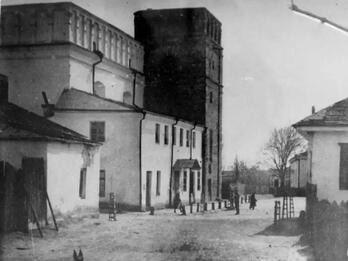Yosef omets (He Will Be Stronger): On Going to the Synagogue
[ . . . ] 5. When one wishes to go to the synagogue, he should say, “I will go to the synagogue for the sake of the unification of the presence of the Holy One and to raise it from its fall,” as stated in Reshit ḥokhmah [Beginning of Wisdom, 1579]. One is obligated to recite the same formula before performing any commandment, in accordance with the kabbalah. An additional benefit of this recitation is that one will thereby have the intention to fulfill a commandment; since according to the opinion that commandments require intention, one has not fulfilled his duty if he did not have the intention to do so. Even according to the opinion that commandments do not require intention, there is clearly a difference between one who has intention and one who lacks it. Even if it is uncertain whether intention is required, in a matter involving a Torah obligation one should act stringently, as written in Sefer ḥaredim [The Book of Those Who Fear]. If one does not understand this formula [which is in Aramaic], he should at least say, “I am going to the synagogue to perform the commandment of my Creator and Master.”
6. It is very meritorious to run to the synagogue. Even if one is in the middle of studying, when the summons is issued for people to come to the synagogue for the afternoon and evening prayers one should not be at all late, nor should one be ashamed of mockers who call him a foolishly pious individual. Nevertheless, one should not argue with them, and if people accost him and wish to speak with him, he should put them off until after leaving the synagogue. [ . . . ]
14. The great kabbalists R. [Moses] Cordovero and R. Isaac Luria Ashkenazi, of blessed memory, forbade all secular conversation in the synagogue, even when prayers are not being recited, as stated in Sefer ḥaredim in their name. R. Hannanel, may he rest in peace, wrote at length about this, before concluding with the following admonition: at least those who are learned in Torah should not begin to talk about their business, even not during prayers, and if someone speaks with them, they should answer briefly.
15. In Sefer ha-yir’ah [The Book of Awe] it is written that while seated in prayer, one should not lean back, nor should one lean to the side in a haughty manner. Rather, one should sit with his head bent, to avoid seeing the face of a person sitting opposite him, beyond his private space [lit. beyond one’s four cubits]. One should not stretch out his legs, but his thighs should be ready to stand, to maintain a state of trembling and awe. [ . . . ]
62. I saw that most people seek to act meticulously and righteously, as they think that one is fulfilling a commandment by bringing his children to the synagogue, even a small child who is not yet old enough to be educated. However, they are making a great error, for not only are they not fulfilling a commandment, they are actually committing a transgression, as children confuse them and everyone else with their screaming, and the father is so preoccupied in watching over the child, he is unable to pray, even without intention, and it is certainly impossible for him to have the proper intention. Furthermore, he has to worry whether the child will wet itself, in which case it will be necessary for everyone standing within four cubits to stop praying, and this is a great stumbling block. I saw in a small book entitled Derekh [ha-]ḥayim [The Path of Life], printed in Constantinople, a quotation from our sages of blessed memory, from Tractate Ḥagigah [3a], “Why do the children come? To provide a reward to those who bring them.” That author wrote, “By my life! The children they bring to the synagogue nowadays provide a punishment to those who bring them,” and he proceeded to cite reasons for this at length.
63. If someone wishes to habituate his children to the synagogue while they are small, he should have his wife bring them with her to the women’s synagogue, for we are not as strict regarding the possible interference with the intentions of women or the dirtiness of urine in the women’s synagogue. This is because there is no cantor there, or holy ark, or Torah scroll. However, regarding small children who know how to respond “Amen,” “may His name be great,” and the responses of Kedushah, and who are capable of standing in awe without playing and nudging their fathers, the father is obligated to bring them to the synagogue and other religious ceremonies, in order to educate them in sacred matters in their childhood. Nevertheless, he should be careful not to interrupt his prayers for them in a place where it is forbidden to stop. When he wants to instruct them or teach them what to pray on a festival, or what liturgical song to recite, he should tell them when he reaches a place where it is permitted to stop.
64. It is forbidden to seat or let an infant stand on the shtender [rack] on which prayer books are placed, as it is set aside for holy books. R. Eliezer of Metz wrote concerning those benches upon which children are seated in the synagogue, that the owners are not permitted to bring them back to their homes to sit on them. Even if they are willing to provide better replacements, such objects may not be changed from their sanctity, and one who is stringent in this regard will be blessed. The Sefer ḥasidim writes that this is forbidden even in the case of a table upon which people eat.
65. It is further written in Sefer ḥasidim that one may not kiss a child in a synagogue, so that one should not display the love of a person in opposition to the love of God. [ . . . ]
66. One may not leave the synagogue except for a great need. Even if a gentile whom he needs is in his house, he should delay going until the end of prayers, unless it is clear to him that the gentile will leave and not return again, and he will thereby definitely suffer a loss. Even if one has a great need to speak, in any event he may not stop between “the Creator of light” [Yotser or] until the end of the silent recitation of the Amidah [the principal part of morning prayers]. If one is in the middle of the introductory psalms [preceding the morning service], he should not pause until the end of “And Your Name shall be praised” [Yishtabaḥ, the benediction following those psalms]. If one waits even longer, until the end of Kedushah and the Amen following it [the principal part of the prayer leader’s recitation of the prayers], how good and faithful is your Taskmaster, for He will reward you for your action and compensate you for your loss.
67. Before leaving one should sit for a while and recite the verse: Surely the righteous shall give thanks unto Your name; the upright shall dwell in Your presence (Psalms 140:14).
68. When leaving the synagogue, one should walk slowly and turn oneself to the side to avoid turning his back to the holy ark, perish the thought. The reason one should walk slowly is to avoid the appearance that the worship of God is a burden upon him.
Credits
Joseph Yuspa Hahn Nordlingen, “Yosef omets (He Will Be Stronger): On Going to the Synagogue” (manuscript, Frankfurt am Main, 17th century). Published as: Joseph Juspa Nördlingen Hahn (Joseph Yuspa ben Phinehas Seligmann Hahn), Sefer Yosef omets: Kolel dinim u-minhagim le-khol yemot ha-shanah ... minhage Frankfurt, ed. Moses Mainz (Frankfurt am Main: Bi-defus Ḥermon, 1928), pp. 2, 5, 15–17 (nos. 5, 6, 14, 15, 62–68).
Published in: The Posen Library of Jewish Culture and Civilization, vol. 5.




